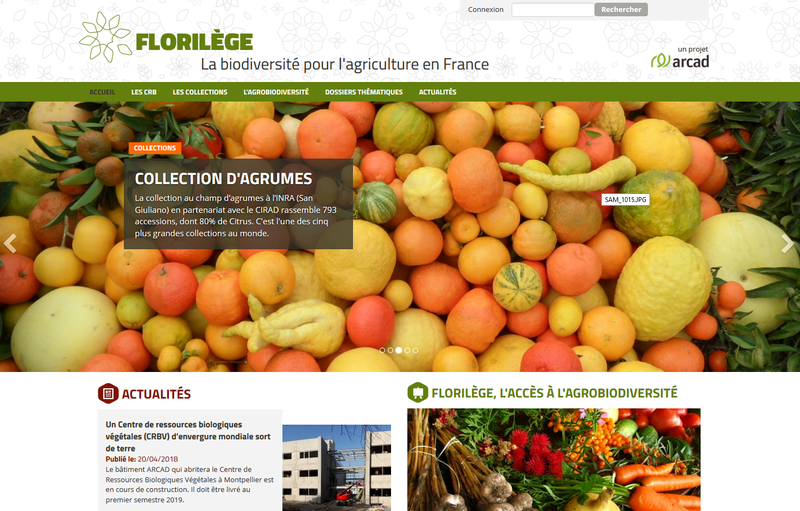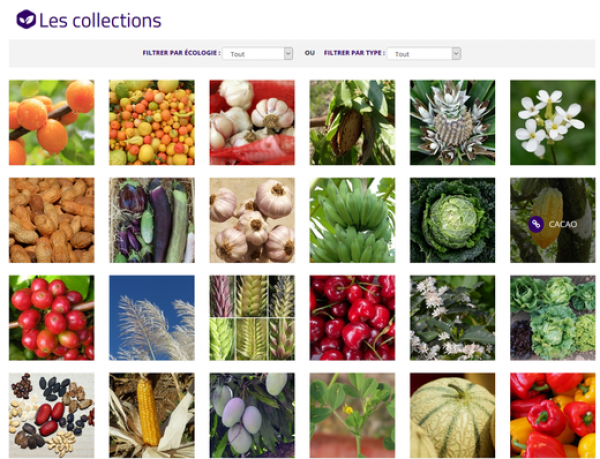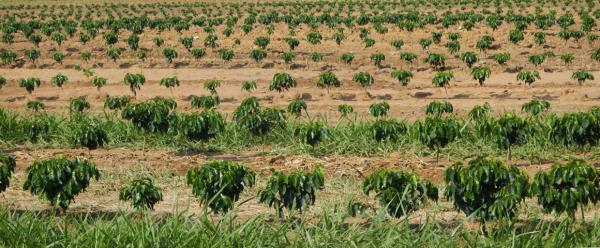- Home
- Press area
- Press releases
- Florilège French agro-biodiversity
Florilège: a gateway to the agro-biodiversity in France

Florilège portal home page
Are you a farming professional, breeder, researcher or teacher working on something that requires access to crop genetic diversity, or merely curious about it? Florilège is made for you: http://florilege.arcad-project.org/
Online access to the plant genetic resources held by eighteen French BRCs
The web portal, which was launched to mark World Biodiversity Day, gives access to a full description of the temperate and tropical crop collections* held by 18 Biological Resource Centres managed by INRA, CIRAD and the IRD. The centres are in mainland France (apricot, cherry, melon, tomato, cereals, rapeseed, wheat, barley, oat, rye, maize, legumes, rice, etc), Corsica (citrus) and the French overseas regions (banana, sugarcane, mango, coffee, cocoa, pineapple, vanilla, yam, rubber, etc). They total 27 000 plant accessions - living plants in the field, seeds, and in vitro tissue cultures - that can be requested from each BRC.
"At our BRC, we currently handle some forty orders a years and supplied 435 accessions last year", says Michel Roux-Cuvelier from CIRAD, who heads the Tropical Plants BRC in the West Indies. "Most requests come from scientists, but associations and even private individuals sometimes get in touch too."
"At a time when crop diversity has shrunk considerably, it is vital that we conserve the remaining agro-biodiversity in order to respond to climate change, pests or diseases, which can devastate entire agricultural supply chains", Christophe Jenny, the CIRAD researcher in Montpellier who coordinates the Florilège portal, adds. For instance, the Citrus BRC in Corsica contributed to the varietal programmes launched to revitalize the citrus supply chain in Guadeloupe, which had been all but destroyed by the arrival of citrus greening, a bacterial disease transmitted by an insect) in 2012. By facilitating access to the available information on the plant genetic resources held in France, Florilège is therefore helping to support agriculture in the light of global change.
It is also allowing France to participate in global crop diversity conservation efforts, by virtue of collaborations with international databases on plant genetic resources (Eurisco, GeneSys) or biodiversity (GBIF).
One of the first banks in the cultivated world, in Montpellier in 2019
Florilège is the portal for the "Plants" component of the agricultural resources for research (RARe) infrastructure. It was set up by CIRAD, INRA and the IRD under the ARCAD (Agropolis Resource Centre for Crop Conservation, Adaptation and Diversity) programme, which is building a platform in Montpellier for the conservation, study and promotion of Mediterranean and tropical crop genetic resources.
ARCAD comprises a scientific component, including this information-sharing element, and an infrastructure component, with the construction of a building that will house all the genetic resources held by the Tropical, Maize and Medicago BRCs. "The building is being constructed around a 500-square-metre seed storage platform, with a robotic cold storage unit at its heart that will be unique in Europe" , says Jean-Marie Prosperi from INRA in Montpellier. The centre will also have substantial analysis capacity, will come into service in the first half of 2019, and will bring together 90 researchers and genetic resource managers. According to Jean-Louis Pham from the IRD and Agropolis Fondation, "it is the synergy between these various functions that will make ARCAD a novel, innovative centre for agro-biodiversity" .
ARCAD is funded by the EU (ERDF), the Occitanie Regional Council, the Montpellier Méditerranée Metropolitan Council, Agropolis Fondation and its partner organizations: CIRAD, INRA, the IRD and Montpellier SupAgro.
* 21 INRA collections (including one on olive in collaboration with the Conservatoire Botanique Méditerranéen), 14 CIRAD collections, and 1 IRD collection (co-managed with CIRAD). Florilège is intended to cover other collections in future.
BRC staff members are also often involved in training operations relating to biodiversity knowledge and management.



























.jpg)